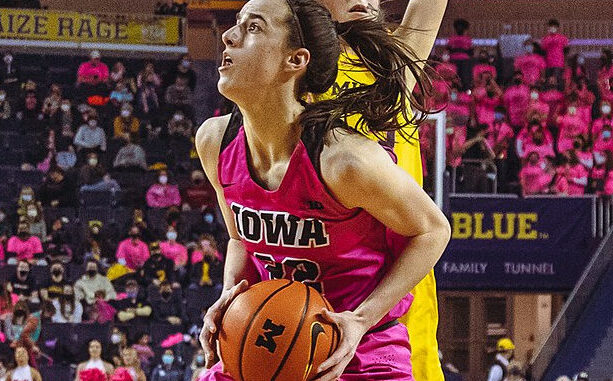
Rory Brouillard | Staff Writer
April 13, 2023
The NCAA women’s basketball tournament consistently brings in significantly less viewers than the men’s tournament. However, women’s basketball seems to become a focus when there is a controversy on sportsman-like conduct.
Caitlin Clark and Angel Reese met head-to-head on April 2 during the NCAA women’s basketball championship game. Clark, Iowa’s star point guard, has seemed to become the center of attention with her talent, bringing in more viewers than normal.
Reese, a 20-year-old forward at LSU, helped bring her team to the NCAA championship after her transfer from Maryland. The odds were in LSU’s favor, but Clark was still a fan favorite.
The match-up of LSU and Iowa was a game to watch as two of the top NCAA women’s basketball players fought hard for their team to earn the title.
By halftime, LSU held a commanding 59-42 lead. The Tigers never looked back, as they defeated the Hawkeyes by a 102-85 score.
Controversy came toward the end of the game after an interaction between Clark and Reese, in which Reese went up to Clark and waved her hand over her face, mimicking John Cena’s trademark “you can’t see me” gesture. She then pointed to her ring finger, showing Clark where her championship ring would sit.
Obviously, sportsman-like conduct is always valued, but a little rivalry never hurts anyone. Subtle bragging and victory gestures are always seen and often praised during sports, such as touchdown dances during football games.
People began speaking out against Reese on social media platforms, saying how it was wrong and that she should be punished for her actions.
But why?
Clark was seen making a similar gesture to another player in a prior game, but received no backlash for her actions.
Some speculated that the backlash toward Reese came because she is Black.
Women are supposed to be seen as kind and “lady-like.” The media see these gestures as going against these ideals, and many claim women are playing with too much emotion.
Clark told ESPN, “Men have always had trash talk … You should be able to play with that emotion … That’s how every girl should continue to play.” She also mentioned that trash talk should be expected in a competitive game like an NCAA championship game.
What Reese did was no different than the normal, light trash talking that is seen during almost any sporting event.
Reese has spoken out, saying that she has been criticized all year for acting “too ghetto.” She didn’t apologize for her actions, but pointed out the double standard that is in place. There is minimal criticism for other players trash talk, but there is uproar toward her.
LSU Head Coach Kim Mulkey said, “She trash-talks on the court, but she doesn’t cross, really, the line of vulgarity. She’s had technicals called this year and she’s not going to apologize for it.” Mulkey said that Reese knows the rules, and they have never had to get outsiders involved due to her actions.
Reese does not deserve any backlash. She is an athlete with great talent who has found ways to stay competitive, while also not crossing the line.
It is wrong to criticize to Reese for something that other athletes do without any trouble. It comes down to one thing, race.
Social media takes a Black woman, who is confident and proud of her abilities, and turns it around into something hurtful.
Reese has proven her abilities to the whole country, but it has been pushed to the shadows by a simple gesture.
Despite the backlash, many have come to stand by Reese’s side. This includes former NBA star and LSU alum Shaquille O’Neal, who said, “She’s probably the greatest athlete ever to come out of LSU sports. You heard it here first.”
Clark also responded saying, “I don’t think Angel should be criticized at all. I’m just one that competes, and she competed.” She also mentioned that she is a big fan of Reese and thinks she deserves nothing but praise.
When it comes to athletics, it is important to not let double standards creep through. Let all athletes play a fair game and have fair representation. Their talent and skill should speak for itself, and success shouldn’t be overshadowed by opinions based on race and gender.

